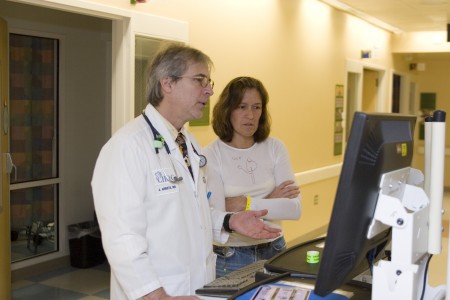Translational Research With Global Implications
Infections are common in healthy children as well as in children affected by underlying diseases, which places them at increased risk for serious infections. CHOC focuses on research in a few key areas to identify simple yet impactful opportunities to increase diagnostic accuracy, simplify treatments and improve outcomes.- Improved diagnosis of serious bacterial infections in febrile infants: Infants 3-90 days old with suspected bacterial infections typically undergo testing and hospitalization for antibiotic treatment while awaiting culture results. Our surveillance program allowed us to identify that infants whose fevers are caused by urinary tract infection (UTI) had uniformly good outcomes compared to those without UTI symptoms. We are working on improved ways to identify UTI using biomarkers of inflammation in urine and blood which we postulate will decrease unnecessary procedures and hospitalizations in febrile infants. We are also doing full genomic analysis of the E coli responsible for UTI and contrasting it with invasive strains of E coli not associated with UTI to better explain the differences we have noted clinically.
- Improved management of children with severe pneumonia: Severe pneumonia is the number one cause of death worldwide in children under 5 outside of the neonatal period. CHOC works with the Orange County Health Care Agency and industry partners to better identify the pathogens escaping vaccine protection. We have also worked in demonstrating the safety of oral antibiotics at home rather than prolonged hospitalizations for the management of severe pneumonia. We are currently partnering with industry to validate a simple urine test to identify the pathogen responsible for pneumonia, allowing for better treatment and the development of improved pneumonia vaccines.
- Improved treatment for newborns with early onset sepsis: Newborns 0-3 days old who acquired infection during labor or shortly after birth have a high risk of mortality; we are conducting studies to evaluate the adequacy of current antibiotic treatment recommendations to improve outcomes and minimize toxicity. Our surveillance of positive blood cultures has informed us of the perinatal risk factors associated with serious infections and the pathogens associated with increased mortality. These data have been submitted to the European Conference on Chemotherapy and Infectious Diseases.
- Necrotizing enterocolitis in premature infants: CHOC researchers have been working to better understand necrotizing enterocolitis, a devastating intestinal complication of prematurity that affects 10% of premature infants, with a high mortality rate of about 20%. This infectious disease has a very high risk of long-term complications, specifically intestinal failure. Our research explores the immunology and inflammation of premature newborns’ intestines in relation to the different feeding practices necessary to support these infants and the microbiome that populates their gastrointestinal tracts. Our team looks at ways to preemptively identify the inflammatory process associated with this disease and predict which of these babies will be at risk of developing necrotizing enterocolitis to prevent intestinal damage and mortality. Our blood culture surveillance program has allowed us to identify the pathogens associated with this infection, and we have been able to create treatment guidelines that will improve outcomes and minimize toxicities and cost associated with the care of these patients.
- Antibiotic dosing in cancer patients with sepsis/septic shock: Our team is studying how to better dose existing antibiotics in immune compromised patients with sepsis and septic shock. The sepsis disease state, characterized by a sequence of metabolic and hemodynamic processes, changes the way antibiotics are cleared in these patients, affecting their probability of surviving serious infection.
- SARS-CoV-2 infections and COVID-19:
- COVID Convalescent Plasma (CCP): Faced with the rapidly evolving SARS-CoV-2 pandemic we rapidly developed treatment strategies that would safely treat our COVID-19 patients. We established and studied a treatment program using CCP, and our findings have been reported in several national and international meetings and published in peer reviewed journals. We have continued our work and in collaboration with other investigators at CHOC, UCI and industry and are conducting studies to understand the mechanism of disease in COVID-19 and its complications, like Multisystem Inflammatory Syndrome (MIS-C) and Long COVID.
- Multisystem Inflammatory Syndrome (MIS-C): CHOC researchers are actively researching the mechanisms of disease around serious complications in children as a result of MIS-C. We presented data in two of the largest international conferences worldwide in July 2021. We continue to work towards better understanding this infection and why certain populations are more seriously affected, including studying the immunology of MIS-C in relation to the different phenotypes of the disease.
- COVID-19 Publications: –Long-Term Effects of Malnutrition on Severity of COVID-19 –Safety & Antibody Kinetics of COVID-19 Convalescent Plasma for the Treatment of Moderate to Severe Cases of SARS-CoV-2 Infection in Pediatric Patients –Weighing the Risks of Perimyocarditis with the Benefits of SARS-CoV-2 mRNA Vaccination in Adolescents
- Respiratory viral infections: Dr. Jasjit Singh, and the department of Infection Prevention have conducted research into local viral outbreaks and their impacts, including RSV, Human Metapneumovirus and Entero/Rhonovirus. This research has been presented in several national conferences and has resulted in several publications in peer reviewed journals.
- Outbreak investigations: The IP team has investigated several outbreaks and worked in concert with county and state public health officials to help identify, treat and work towards preventive interventions. These publications have included:
- Measles outbreaks
- A local outbreak of non-tuberculous mycobacteria
- Hospital infection prevention: We have characterized and helped define appropriate protocols for the isolation and management of hospitalized pediatric patients with multi-drug resistant organisms, including:
- Extended spectrum beta lactamase infections
- Vancomycin resistant enterococcus infections
- We have also outlined the epidemiology and patient population at risk for respiratory virus infections such as human Metapneumovirus infections, hospital acquired respiratory viral infections, as well as described the unfolding changes in epidemiology of common respiratory viruses during the COVID-19 pandemic.
- Vaccine hesitancy: Vaccination is one of the greatest public health tools available for the prevention of infectious diseases. Vaccine resistance results in more frequent outbreaks of infections that have been previously controlled, such as measles, pertussis and others. Members of our division collaborate with other institutions to better understand and overcome vaccine hesitancy and improve vaccination rates nationwide.
- Vaccine efficacy: We are also involved in evaluating different ages and dosing strategies to reduce the number of injections necessary and improve vaccine efficacy. Our team has studied the safety and efficacy of a number of different vaccines, including hepatitis A, MMRV and meningococcal conjugate vaccine. We are also currently involved in an NIH study to look at completion of the HPV series depending on time of initiation. Our hope is that starting this anti-cancer vaccine series at a younger age (9y) will result in higher rates of full vaccination with known better immune responses.
- Pneumococcal vaccine research: Pneumococcal disease affects millions worldwide, especially in developing countries. Pneumococcal infections can range from ear and sinus infections to bloodstream infections and meningitis. Pneumococcus is also the most common bacterial pathogen associated with severe pneumonia in children. Pneumonia remains the number one cause of death of children under 5 years of age worldwide and accounts for about 3 million deaths each year. CHOC’s research team is conducting prospective surveillance data of invasive pneumococcal disease in Orange County to try to identify the types of pneumococci that cause severe disease in children.

















